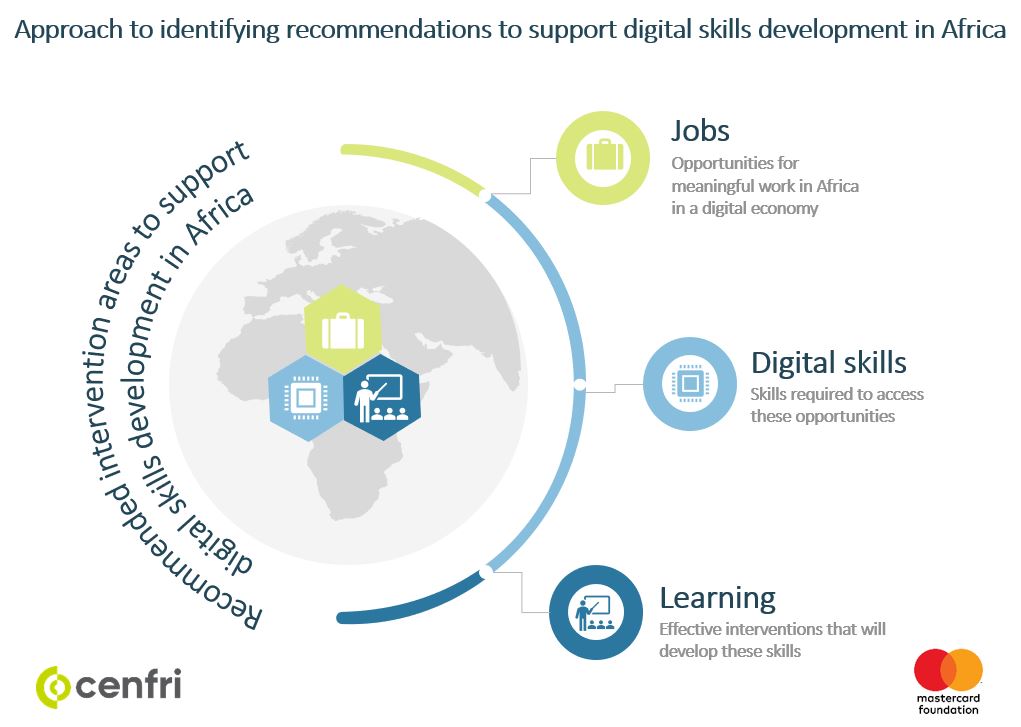Digital skills in Africa
Digital skills in Africa
30 March, 2020 •How can young people in Africa develop the right skills for employment and income in the digital economy?
Our landscaping study on digital skills in Africa explored this issue and trends on the future of work in Africa. The approach of this study focused on identifying recommendations to support digital skills development in Africa. We created a framework to help decision-makers and organisations make sense of what digital skills are and what they are needed for.
Our country-based diagnostics for Kenya, Ghana and Senegal focused on the supply and demand for digital skills, and the enabling environment, providing recommendations for policymakers on boosting digital skills. Our primary research in Kibera, Kenya, demonstrates the breadth of digital skills already being used in the informal economy, and where there is a need for greater learning and exposure opportunities.
 Figure 1: Recommended intervention areas
Figure 1: Recommended intervention areas
Our findings focused on three intervention areas and are listed in the following sections: digital skills, learning digital skills, and work in the digital economy.
Digital skills
To access opportunities, four levels of digital skills are required:
- Consumer skills are the capabilities that individuals need to function socially, economically and politically in a digital society.
- Productive skills are the skills that individuals require to apply existing digital technologies for productive purposes.
- Developer skills are the skills required to develop, customise or modify digital technologies and digital infrastructure.
- E-leadership skills are the skills required to conceive and execute business models to deliver public or private goods by utilising digital technologies.
Learning digital skills
This section describes the learning approaches that are best suited for the different levels of digital skills. We found that online tech-focused courses cannot deliver meaningful skills on their own. The human element of learning and exposure to tangible experiences, practical problem-solving and group work are critical for success.
Work in the digital economy
- The mobile phone is the digital device of choice for business purposes and social purposes. It is how most people in Africa connect to the internet.
- Most jobs require growing levels of productive digital skills.
- The informal economy, where over 80% of African youth earn their income, is a social media economy, whether for communicating with customers, sharing photos to market goods and services, or to send and receive digital payments. This requires consumer digital skills, which are mostly self-taught or acquired with the help of an agent.
- Digital platforms that deliver industrial goods and services create new income opportunities but require some productive digital skills.
- Workers in the gig economy, where digital goods and services are produced and traded, require more advanced productive skills, and the income opportunities in SSA are limited.
- The small but growing ICT and tech sector requires advanced digital developer skills that are not currently produced by public or private education in sufficient quantities. There is a strategic gap in developer skills that limits the ambitions of African countries that are aiming to reach middle-income status.
- Public-sector and private-sector leaders increasingly need to navigate and shape systems and business models that can thrive in the digital economy. E-leadership skills have become essential for their success.
For more information, watch this video on making sense of digital skills in Africa, read the executive summary or contact Albert van der Linden.
insight2impact (i2ifacility) was funded by Bill and Melinda Gates Foundation in partnership with Mastercard Foundation. The programme was established and driven by Cenfri and Finmark Trust.





